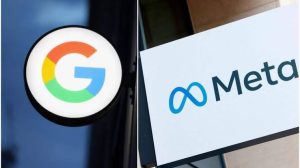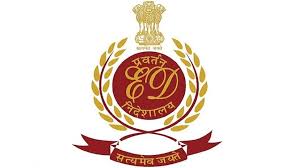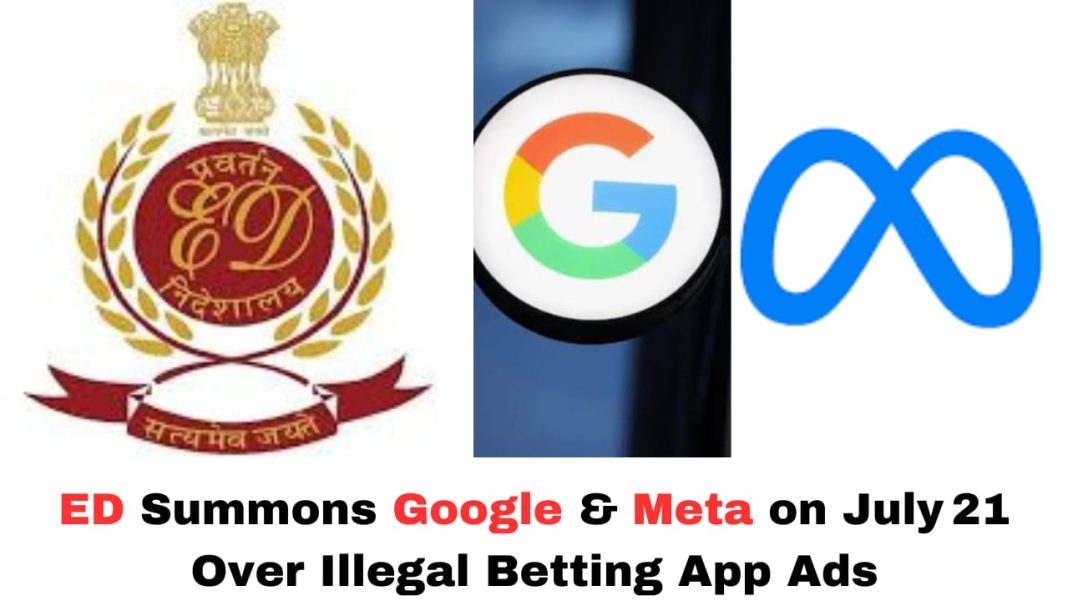Digital News Guru New Delhi Desk:
ED to Question Google & Meta Executives Over Betting App Promotions
In a dramatic surge of its crackdown on digital financial crime, India’s Enforcement Directorate (ED) has served summons to executives from Google and Meta, demanding their presence at the ED’s New Delhi office on July 21, 2025. The orders are part of a sweeping investigation into illicit betting apps allegedly facilitating money-laundering through unregulated networks of online gambling platforms.
What prompted the summons
Two senior government sources told Reuters that the ED’s probe has zeroed in on whether Google and Meta provided advertising support and algorithmic amplification for illegal betting apps, contravening a 2022 advisory by the Ministry of Information & Broadcasting that cautioned against promoting gambling content due to its socioeconomic risks.

Alongside these promotional allegations, the ED is meticulously examining the advertising revenues Google and Meta may have received from betting platforms, as well as the possibility that these platforms knowingly permitted betting apps to flourish via targeted ad spaces and heightened visibility.
Neither Google nor Meta has issued a public statement in response; both were reported as unresponsive to requests for comment.
Underlying probe: dabba trading, white‑label apps, hawala
This action is only the latest move in a larger pursuit targeting a network of “dabba trading” and betting apps — many camouflaged as skill‑based gaming platforms. The ED’s ongoing investigation covers a slew of platforms including VMoney, 11Starss, LotusBook, GameBetLeague, Standard Trades Ltd, IBull Capital, and VM Trading, which allegedly rely on offshore structures and exploit hawala operations to wash funds.
According to statements from ED officials to the New Indian Express, the paid‑promotion-based platforms utilize white‑label models, where administrative (“ADMIN”) rights are shared with local promoters in return for profit‑sharing deals. For instance, VMoney and 11Starss’s promoters reportedly acquired ADMIN privileges from LotusBook with a 5% revenue share, which was later reallocated between Vishal Agnihotri, Dhaval Devraj Jain, and others.
A key hawala operator, Mayur Padya (alias Padya), allegedly managed cash‑based fund movements, aiding in laundering proceeds of illegal operations.
These revelations follow raids in Mumbai that led to seizures of Rs 3.3 crore in cash, luxury vehicles, jewellery, foreign currency, and cash-counting machines. The case was initially triggered by a First Information Report (FIR) filed on January 9, 2025, at Lasudia Police Station, Indore, invoking sections of the Prevention of Money Laundering Act (PMLA), under the Bharatiya Nyaya Sanhita.
Why Google & Meta are now in the ED’s crosshairs
The ED’s summons appear aimed at establishing whether Google and Meta officials were aware that their platforms were being used to:
- Promote illegal betting apps via adverts or algorithmic recommendations.
- Profit from such promotions via ad revenue.
- Assist the spread of these apps despite government advisories.
The two tech giants are reportedly expected to clarify their ad‑placement policies, vetting processes, and internal controls to prevent promotion of illicit content.

Broader crackdown on influencers and celebrities
The investigation has also widened to include celebrities and influencers, with at least 29 personalities under ED scrutiny for allegedly endorsing illicit betting apps. High-profile names such as Vijay Deverakonda, Rana Daggubati, Prakash Raj, and others have been booked under ECIR (Enforcement Case Information Report) in areas like Andhra Pradesh and Telangana.
One of the major cases tied to this crackdown is the Mahadev Betting App scandal, previously exposed for laundering over Rs 40,000 crore through hawala routes. The scam involved questionable profit‑sharing, shell firms, and international money trails, resulting in FIRs filed as early as 2023; even BJP-linked figures faced allegations of receiving kickbacks.
Other cases, such as Fairplay’s IPL betting controversy, have intensified regulatory scrutiny around illegal betting involving IPL streams, resulting in arrests and asset attachments under PMLA.
What’s at stake — legal, financial, reputational
If the ED determines that Google and Meta either knowingly or negligently facilitated the spread of illegal betting apps, consequences could be severe, including:
- PMLA‑based asset freezes or monetary penalties.
- Regulatory injunctions on advertising policies in India.
- Mandated internal content audits and transparency mandates.
- Reputational damage during a phase of heightened scrutiny of Big Tech’s responsibility in India’s digital ecosystem.
For Google and Meta, whose Indian user base numbers in the hundreds of millions, stringent legal responses could force significant changes in their ad vetting mechanisms and algorithmic oversight.
Timeline & what to watch
- July 21, 2025: ED questioning of Google and Meta officials in New Delhi — first major face‑to‑face developments.
- ED findings post-interrogation may lead to searches, evidence seizures, or financial penalties.
- Policy aftermath could include new government regulations on legal accountability of digital platforms.
The bigger picture
India’s tech‑regulatory stance is evolving. Once focused primarily on data privacy or content regulation, authorities are now treating digital platform governance as part of anti-laundering strategies. The ED’s involvement in unravelling clandestine financial networks via tech-enabled channels marks an expanded vision of national financial integrity.

As platforms like Google and Meta grapple with tougher oversight, stakeholders — including policymakers, telecom operators, and tech firms themselves — will closely monitor the legal trajectory of this case. Its outcome could redefine responsibility standards for online intermediaries, impacting India’s future digital economy.
Final Thoughts
The ED’s summons marks a watershed moment: a global tech platform called to account over digitally facilitated betting and money‑laundering networks. With questioning scheduled on July 21, the focus will be on whether Google and Meta turned a blind eye — or worse, enabled a system that circumvents national gambling laws. Their responses may set a precedent for how Big Tech must monitor and moderate high‑risk content in India’s online ecosystem.
You May Also Read: Sangeeta Bijlani’s Pune Farmhouse Vandalized and Looted








